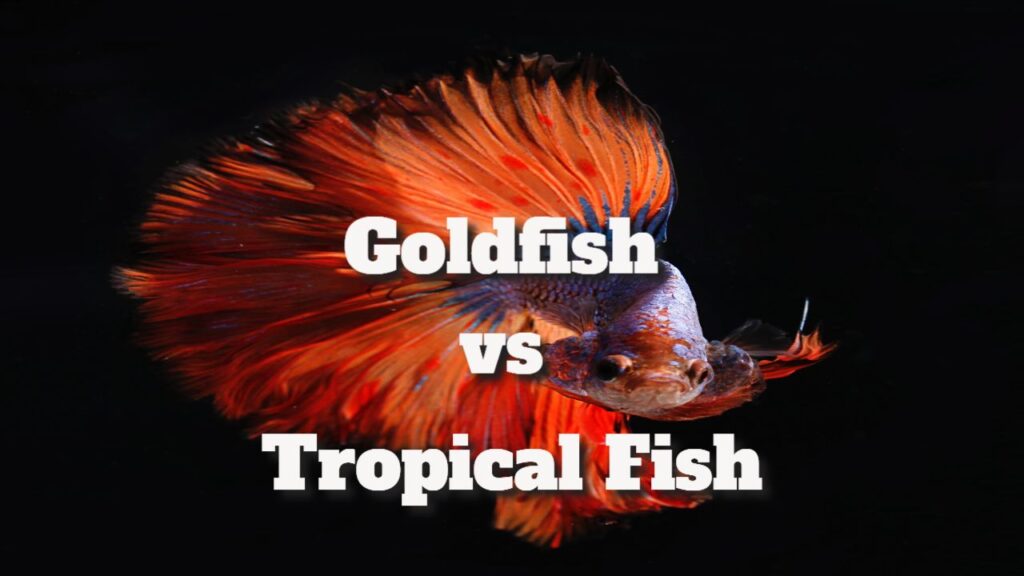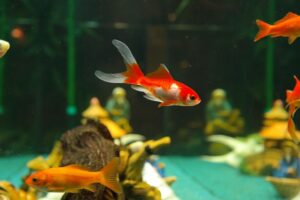Discover the Key Differences Between Goldfish and Tropical Fish for Your Aquarium
Keeping fish as pets is a popular hobby enjoyed by many across the globe. However, for those who are just starting their aquarium journey, choosing the right fish species can be quite challenging. Among the most favored choices are goldfish and tropical fish. Although they might appear similar at first glance, these two types of fish have significant differences that are essential to understand for successful fish keeping.
Goldfish are freshwater fish that originate from East Asia and are typically kept in cold-water aquariums. They are known for their resilience and can adapt to a variety of water conditions, making them an excellent choice for beginners. In contrast, tropical fish thrive in warm waters and require a heated aquarium to survive. They are generally more sensitive to changes in water quality and temperature, demanding greater care and attention from their owners.
When it comes to physical characteristics, goldfish typically exhibit a round shape with a short tail, while tropical fish come in a variety of shapes, sizes, and vibrant colors. Their behavior also differs significantly, highlighting the importance of understanding these distinctions when selecting the right species for your aquarium environment.
Understanding the Basic Requirements for Goldfish and Tropical Fish Care
This section delves into the fundamental needs of both goldfish and tropical fish, focusing on two critical aspects: tank size and environment, as well as water temperature and composition.
Optimal Tank Size and Environment for Healthy Fish
The size of your aquarium plays a pivotal role in the health and well-being of your fish. As a general guideline, a single goldfish requires a minimum of 20 liters of water, with an additional 10 liters for each subsequent goldfish. A useful rule of thumb is to allocate at least 1 liter of water for every centimeter of fish in your tank.
In addition to tank size, the surrounding environment is equally important. Tropical fish thrive in moderate water flow and benefit from plenty of hiding spots, while goldfish favor larger tanks with minimal water movement. Incorporating plants, rocks, and caves can create necessary shelters for the fish, and employing a quality filter will help maintain clean and healthy water conditions.
Essential Water Temperature and Composition for Fish Health
Goldfish are classified as cold-water fish and prefer water temperatures ranging from 18 to 24°C. In contrast, tropical fish thrive in warmer waters with optimal temperatures between 24 and 28 degrees Celsius. It is crucial to regularly monitor and adjust the water temperature to keep your fish comfortable and healthy.
When considering water composition, goldfish flourish in water with a pH range of 7.0-7.5 and a hardness of 100-150 ppm. Tropical fish, however, prefer slightly acidic water with a pH of 6.5-7.0 and a hardness between 100-200 ppm. Adhering to these fundamental guidelines can significantly enhance the living conditions for your goldfish or tropical fish, ensuring they thrive and bring joy to your aquarium.
Exploring Nutrition and Feeding Practices
Understanding Dietary Differences
Goldfish are classified as omnivores, meaning they consume both plant and animal-based diets. They possess a relatively simple digestive system and can thrive on a diet consisting of fish flakes or pellets. To maintain their health and happiness, it's essential to supplement their diet with fresh vegetables such as peas, spinach, and lettuce. Additionally, goldfish enjoy live or frozen food options like bloodworms and brine shrimp, which provide vital nutrients and variety to their meals.
Conversely, some tropical fish species are carnivorous, requiring a meat-based diet that may include prawns or other small fish.
Determining Feeding Frequency for Optimal Health
Goldfish have a slower metabolism and can go longer periods without food. Ideally, they should be fed once or twice a day, offering only as much as they can consume in a few minutes. Overfeeding can lead to health complications such as constipation and swim bladder disorders.
Depending on the specific tropical fish species, they may need to be fed two to three times daily, with smaller portions at each feeding. It is imperative to remove any uneaten food promptly, as it can quickly pollute the aquarium water and lead to health issues for the fish. Understanding the nutritional requirements and feeding habits of your fish is crucial for ensuring they receive the proper diet and stay healthy. By providing balanced nutrition and proper portioning, you can help your fish thrive in their aquatic environment.
Life Expectancy and Common Health Issues in Fish Care
Recognizing Common Health Issues
Identifying Parasites and Infections
Both goldfish and tropical fish can fall victim to various health issues, including parasites like ichthyosis, velvet, and gill worms. Symptoms of parasitic infections may include lethargy, loss of appetite, and visible white patches on the skin or fins of the fish.
Fungal infections can also affect both types of fish, often arising due to skin injuries or subpar water quality. Signs of fungal infections include white or gray patches on the skin or fins, as well as ragged or frayed fins.
Bacterial infections can occur in both goldfish and tropical fish, often linked to poor water quality, physical injuries, or stress. Common symptoms include redness, swelling, and the presence of ulcers on the skin or fins, necessitating prompt attention to maintain fish health.
Average Life Expectancy of Goldfish Versus Tropical Fish
The lifespan of both tropical fish and goldfish is influenced by several factors, including species, diet, water quality, and overall care. Goldfish generally enjoy a longer lifespan compared to tropical fish, with some species living up to 20 years when provided with optimal care. However, individual species and the level of care can significantly affect their longevity.
On the other hand, tropical fish typically have a shorter lifespan, with most species living around 3 to 5 years on average. Some specific species, such as angelfish and discus fish, can live for up to ten years or longer if properly cared for. Creating a healthy, stress-free environment is essential for promoting a longer, healthier life for your fish.
Comprehensive Maintenance and Care for Goldfish and Tropical Fish
Effective Cleaning Procedures for a Healthy Aquarium
To ensure your fish remain healthy and vibrant, it is vital to perform regular cleaning of their aquarium. The cleaning procedures differ for goldfish and tropical fish due to their varying needs. Daily removal of uneaten food and waste from the tank is crucial to prevent contamination and ensure clean water conditions for your fish.
Making it a habit to remove all food residues from the tank daily is essential for maintaining a healthy aquatic environment.
Understanding Behavioural Characteristics of Goldfish and Tropical Fish
Social Behavior Insights for Fish Owners
When it comes to social behavior, goldfish tend to exhibit more solitary tendencies compared to tropical fish. While some tropical fish species may prefer solitude, many thrive in groups and require the company of their conspecifics to feel secure and comfortable. In contrast, goldfish are generally content to live alone or with just a few companions.
Examining Activity Levels in Different Fish Species
Goldfish are known for their leisurely swimming style, often seen gently floating around their tank. This contrasts with tropical fish, which originate from warmer waters and must be more active to regulate their body temperature. The differences in behavioral characteristics between goldfish and tropical fish are significant, and it is essential to consider these factors when deciding which fish species to keep in your aquarium.
Your Questions Answered: FAQs About Goldfish and Tropical Fish Care
How Does Aquarium Setup Differ for Goldfish and Tropical Fish?
Goldfish and tropical fish necessitate distinct aquarium setups. Goldfish produce more waste, requiring a larger filter to maintain water quality. They are comfortable in cooler water temperatures, eliminating the need for a heater.
Can Goldfish Coexist with Tropical Fish in the Same Aquarium?
Goldfish can negatively impact water quality when housed alongside tropical fish due to their higher waste production and preference for cooler water temperatures.
What Are the Temperature Requirements for Goldfish Compared to Tropical Fish?
Goldfish thrive in cooler water temperatures ranging from 18 to 24°C, while tropical fish require warmer conditions between 24 and 28°C for optimal health.
Is Goldfish Care More or Less Demanding Than Tropical Fish Care?
While goldfish may require less attention in terms of heating, they necessitate more frequent water changes and a larger filter due to their space requirements and waste production.
How Do Nutritional Requirements Differ Between Goldfish and Tropical Fish?
Goldfish and tropical fish have distinct dietary needs. Goldfish are omnivorous, needing a diet rich in plant matter such as flakes, pellets, and vegetables. In contrast, tropical fish have a more varied diet, requiring a mix of flakes, pellets, frozen or live foods, and plant-based options.
Is It Viable for Goldfish and Tropical Fish to Live Together?
Goldfish can compromise water quality for tropical fish due to their varying requirements concerning water temperatures, space, and waste production, making cohabitation challenging.
The post Discover the Key Differences Between Goldfish and Tropical Fish for Your Aquarium appeared first on Unity Pets.
The post Discover the Key Differences Between Goldfish and Tropical Fish for Your Aquarium appeared first on https://gqcentral.co.uk
The Article Discover the Key Differences Between Goldfish and Tropical Fish for Your Aquarium First Appeared ON
: https://ad4sc.com
The Article Discover the Key Differences Between Goldfish and Tropical Fish for Your Aquarium was found on https://limitsofstrategy.com/


Comments are closed